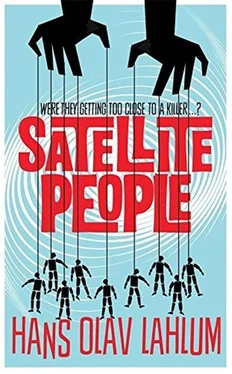There were not many people on the company staff. Magdalon Schelderup did not waste unnecessary money on wages. The manager, Hans Herlofsen, ran the office in the centre of town and was the only person who had an office at Schelderup Hall. He had the best overview of company business and was a very good businessman whom Magdalon Schelderup seemed to trust enormously, but still did not treat particularly well. Schelderup appeared to take his manager for granted, and the manager simply accepted all his sarcasm without ever threatening to resign.
Magdalon Schelderup’s relationship with Petter Johannes Wendelboe seemed to be more equal, according to the secretary. Wendelboe had his own company and had long since sold any shares that he once had in Schelderup’s company. But Schelderup remained in regular contact with Mr Wendelboe and his wife. And as with the sister, it did not appear to be a relationship where they talked much. The secretary had been taken aback by the frequent presence of the Wendelboes, especially as Schelderup had very little contact with anyone outside the immediate family unless for very good reason. She had simply accepted that it was because they had known each other since the war and had probably been close back then. Whatever the case, it was none of her business.
As far as Synnøve Jensen understood, Hans Herlofsen had also known the others since the war, even though he must be around fifteen years younger than Magdalon Schelderup and Petter Johannes Wendelboe. The otherwise good-natured Herlofsen had always made it very clear, though in a friendly way, that he did not want to talk about the war and the years immediately after. Magdalon Schelderup himself never talked about the war, but that was because he was so focused on the present and the future that he did not dwell on the past.
The secretary seemed relieved and stood up as soon as I said that we were finished for today. When she reached the door, she asked for permission to take the first possible bus home. She was tired and it was not very tempting to stay here at the mercy of Sandra Schelderup. I agreed once I had obtained a telephone number where I could contact her. It was perfectly understandable that Synnøve Jensen was tired, and that she had no particular desire to stay there with Magdalon Schelderup’s wife. I asked her to stay in the Oslo area. She looked at me with sad eyes and asked in response where on earth she would go otherwise.
For one reason or another, I stood by the window and watched Synnøve Jensen until she was safely outside the gate. It did not take long. She left the house swiftly and walked away fast, with her head down. It struck me that she was the only one of those questioned so far who would actually miss Magdalon Schelderup.
The manager, Hans Herlofsen, was a slightly overweight man of fifty-five, with greying hair, dressed in a simple grey suit. I could imagine him being a jovial and kind uncle at any other time. But now he was visibly affected by the day’s events and seemed to be somewhat tense at the start of our conversation.
He calmed down when my first questions were about Magdalon Schelderup’s company. Herlofsen quickly proved to have an exceptional head for figures. He could reel off turnover and market shares from the 1940s, the 1950s and the 1960s without any pause for thought. His conclusion was that the Schelderup business empire was going from strength to strength. According to Herlofsen’s calculations, the recent estimate of Schelderup’s worth at 100 million was in fact too low rather than too high. He himself reckoned it to be somewhere between 125 and 130 million, taking into account various estimated fees and charges and the possibility that the value of the company might fall if the company and property portfolio were to be divided up.
With regard to himself, Hans Herlofsen told me in a succinct and practised manner that he was a widower and lived on his own on the first floor of his childhood home in Lysaker. His only son was now a grown man, who lived with his wife and two children on the ground floor. Hans Herlofsen had always devoted himself to his work, and other than his son and his family the greater part of his social life was linked to work. Magdalon Schelderup had been a friend of his father’s, so they had known each other since Herlofsen was a youth. Herlofsen had been employed by the company since the autumn of 1944 and been the manager since 1946.
When asked who he thought might have killed Magdalon Schelderup, Hans Herlofsen replied that the only thing he could say with 100 per cent certainty was that it was not he who had done it. As for the others, he would rather not hazard a guess. With a slightly self-deprecating smile, he added that with eleven others round the table, minus himself and the deceased, there was only an 11.1 per cent chance of getting it right.
I saw no reason, for the moment, to add to his burden by saying that I personally was operating on the assumption of a 10 per cent chance. I had not got any further and did not dare strike Hans Herlofsen from the list of suspects until I knew what was in the will.
As Hans Herlofsen stood up to leave, I realized that I should ask whether he had worked together with Magdalon Schelderup when they were in the Resistance. His answer was another surprise.
‘Yes, of course. But I was more of an assistant to the senior members of the Resistance and was not there when it happened. If you think it might have anything to do with that strange episode from 8 May 1945, you will have to ask the Wendelboes or even Magdalena Schelderup.’
I nodded to show that I understood. Then made a note that I had to ask the Wendelboes about the strange episode that took place on Liberation Day in 1945.
My conversation with the deceased’s ex-wife was brief and without any great surprises. She had a slim body and her neck was almost perilously thin. Her hair, on the other hand, was raven black and her voice was spirited. She seemed far younger in body and mind than her actual sixty years of age.
Ingrid Schelderup was also visibly shaken by the death of her former husband, but her predominant focus was the situation of her son Leonard. She assured me repeatedly that she could guarantee he had nothing to do with his father’s death, and expressed her concern that he would take this very badly, given his sense of duty and responsibility. His relationship with his father was not the best, but it was far better than it had been. And Leonard was the world’s sweetest boy, who would never wish to hurt anyone. It was completely incomprehensible that his father had asked him, of all people, to try his food and then later pointed at him. The only explanation she could think of was that Magdalon Schelderup was no longer the man he had once been, even though that might seem strange to all who knew him.
The conversation dwelled on this theme for a few minutes without going anywhere. She then sat up abruptly in her chair and raised her voice: ‘You must forgive me if I am repeating myself and talking too much about my son. It is all too easy when you are a divorced woman who has only one child. And even though it is now many years since our divorce, Magdalon’s death today was a great shock.’
I immediately felt that she was opening up and assured her that I had the utmost sympathy for her situation. Then I expressed my surprise at the fact that she still regularly visited her ex-husband’s home, so many years after the divorce. She gave a sad shrug.
‘That’s what happened and how I am, unfortunately. I am still Magdalon Schelderup’s wife – even though he threw me out over twenty years ago, and is now dead. I have never got over the divorce. Latterly my life has solely been about the son of the man who threw me out.’
Читать дальше












